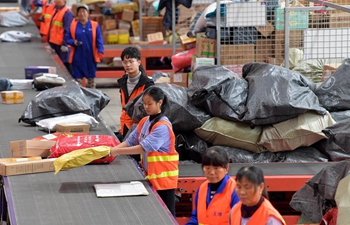CAPE TOWN, Nov. 14 (Xinhua) -- South Africa's climate target is not in line with the Paris Agreement due to the country's heavy dependence on coal, according to a G20 climate action report released here on Wednesday.
The report laments the country's failure to introduce policies aimed at phasing out coal, as many other G20 countries have done, as well as its decision to build new coal power plants until 2024.
If all other countries were to follow South Africa's level of ambition when it comes to cutting carbon dioxide emissions, it would lead to the planet warming up by between 3°C and 4°C above pre-industrial levels, says the Brown to Green Report 2018, which is the world's most comprehensive review of G20 climate action.
This is among the key findings in the latest G20 Brown to Green Report compiled by Climate Transparency, a global partnership of 14 climate research organizations and non-governmental organizations from the majority of G20 countries.
While South Africa is still heavily dependent on coal, the report also notes the very positive shift to renewables in the electricity sector envisaged in the country's draft Integrated Resource Plan, and plans to introduce a carbon tax and a carbon budget system.
The report also praises the South African government for recently kickstarting the stalled renewables program by signing outstanding contracts with independent power producers.
The 20 major economies play a key role for achieving the targets set by the Paris Agreement because they alone account for 80 percent of global greenhouse gas emissions.
The Brown to Green Report draws on the latest emissions data from 2017 and covers 80 indicators on decarbonization, climate policies, finance and vulnerability to the impacts of climate change. Providing country ratings, it identifies leaders and laggards in the G20.
"South Africa has the G20's highest emissions intensity in the power sector due to our extensive reliance on coal for electricity generation," said Andrew Marquard of the Energy Research Center at the University of Cape Town.
The country is facing many challenges in moving away from its coal-based economy, and its new electricity plan will be a big step forward, especially if it excludes the planned new coal plants and accelerates the retirement of old expensive coal plants, said Marquard.
Luckily South Africa has incredible renewable resources, and renewable energy is now significantly cheaper than coal, he said.
Power generation from coal, oil and gas, and transport produce the biggest chunk of emissions in the vast majority of G20 countries, said one of the report's co-authors, Jiang Kejun of the Energy Research Institute in China.
But some countries are already moving ahead, like the United Kingdom or France with their decision to quickly phase out coal and fossil fuel-based cars, he said.
"The G20 economies actually need to cut their emissions by half by 2030 to keep warming below 1.5°C," said co-author Jan Burck of Germanwatch, a non-profit, non-governmental organization based in Bonn, Germany.
"But instead of responding to the urgency of climate change, the G20 countries continue to pour money into factors that drive climate disruption, like fossil fuel subsidies, instead of taking stronger action," Burck said.
Saudi Arabia, Italy, Australia and Brazil provide the highest amount of subsidies per GDP, according to Burck.
"Global emissions need to peak in 2020. The Brown to Green report provides us with an independent stocktake of where we stand now. This is valuable information for countries when they declare their climate contributions in 2020," said Christiana Figueres, former Executive Secretary of UNFCCC (United Nations Framework Convention on Climate Change).













